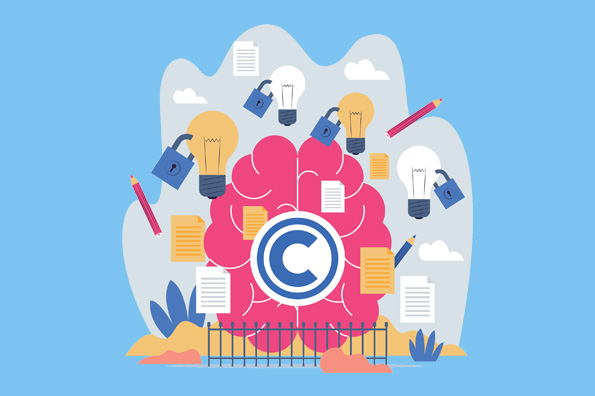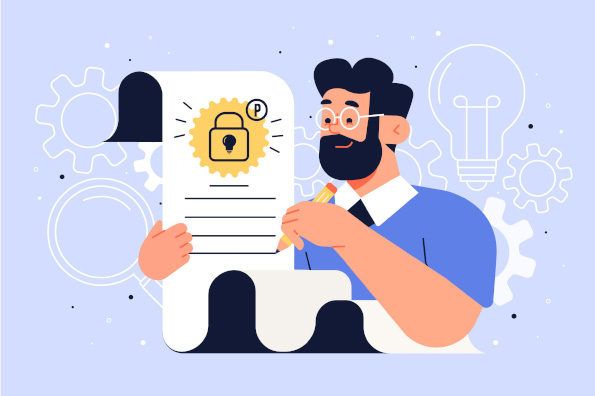Turn Ideas into Assets: Mastering Patents, Trademarks, Copyrights, and Trade Secrets
 Chris Daming, J.D., LL.M. : Jul. 31, 2024
Chris Daming, J.D., LL.M. : Jul. 31, 2024
If you’re like most entrepreneurs, you’re super focused on building your product, acquiring customers, and making sure your business stands out in a crowded market. But there’s one pretty huge piece of the puzzle that might not be on your radar: intellectual property (IP).
As an attorney, I see IP as being possibly the most overlooked legal issue for business owners.
Imagine this: You’ve spent months developing a groundbreaking product, and it’s finally catching on with customers. But suddenly, a competitor starts selling an almost identical version, cutting into your market share. Without IP protection, there’s very little you can do to stop them.
So, how can you avoid that nightmare scenario? It all starts with understanding what IP is, why it matters, and what steps you can take to safeguard your business.


Legal GPS Pro
Protect your business with our complete legal subscription service, designed by top startup attorneys.
- ✅ Complete Legal Toolkit
- ✅ 100+ Editable Contracts
- ✅ Affordable Legal Guidance
- ✅ Custom Legal Status Report
What Exactly Is Intellectual Property?
Let’s start with the basics: intellectual property refers to creations of the mind that are legally protected. These include things like your company’s name, your logo, an innovative product design, or even a secret business process that gives you an edge over the competition. Essentially, it’s anything you create that has value because it’s unique to your business.
There are four main types of IP that most startups should be aware of:
- Trademarks – Protect the identity of your brand (like your logo or business name).
- Copyrights – Protect creative works, such as articles, music, and software.
- Patents – Protect inventions and processes that are new and useful.
- Trade Secrets – Protect confidential information that gives your business a competitive edge (e.g., secret recipes or proprietary strategies).
Each of these offers different types of protection and serves a different purpose, but they all have one thing in common: they help keep your business yours by preventing others from using your unique assets.
Why Startups Need to Care About IP Protection
When you’re just starting out, intellectual property might not seem like an urgent priority. After all, you’re busy launching products, attracting customers, and managing day-to-day operations. But neglecting to secure your IP early on can lead to major headaches—and financial losses—down the line.
Here’s why you should care:
1. Protect Your Work from Copycats
Picture this: You’ve poured time and money into creating a new product that’s starting to take off in the market. Your customers love it, and you're finally seeing real traction. Then, out of nowhere, a competitor comes along with a nearly identical product. They copy your design, sell it at a lower price, and start eating into your market share.
Without IP protection, you’re stuck. Your competitor could even file for a patent or trademark on your product before you do, leaving you with no legal ground to stop them. Essentially, all that time and effort you spent developing your business could go to waste.
Action Step: Secure IP protections early in the game. Whether it's a product, brand name, or process you’ve developed, the sooner you take action, the safer your business will be.
2. Secure Your Brand Identity
Your business’s name, logo, and even product packaging are part of what makes your brand unique. But what happens if a competitor starts using something that looks or sounds too similar to your brand? Worse yet, what if they file for a trademark on that name or logo before you do?
If someone else secures a trademark for a brand name or logo that’s similar to yours, they could force you to rebrand—an expensive, time-consuming process that could confuse your customers and harm your reputation.
Example: Let’s say you’ve launched a successful fitness startup called "FlexTech." You’ve spent months building brand recognition, but you haven’t gotten around to trademarking your business name. Then, you find out a competitor has opened a gym called "FlexTek" and has filed for a trademark on the name. Because they registered the trademark first, you might be forced to change your name and rebrand your entire company, losing valuable momentum and customer loyalty in the process.
Action Step: Before you launch your business (or any new product or service), do a thorough trademark search. Once you’ve confirmed that no one else is using your business name or logo, file for a trademark with the U.S. Patent and Trademark Office (USPTO) to lock down your rights.
3. Attract Investors with Strong IP
If you’re thinking about raising capital to grow your business, having your IP in order is crucial. Investors want to see that you’ve taken steps to protect the things that make your company unique. After all, they’re investing in your ability to stand out in the market, and they want to know that no one else can easily copy what you’ve built.
Securing your IP—whether through trademarks, patents, or copyrights—signals to investors that you’ve taken the necessary steps to safeguard your business’s value.
Action Step: If you're preparing to seek investment, make sure you can show investors that your intellectual property is protected. This not only strengthens your business’s credibility but also makes it a safer bet for investors who want to minimize risk.
Breaking Down the Four Types of IP Protection
Now that you know why IP is so important, let’s take a closer look at the four main types of intellectual property and how they apply to your startup.
1. Trademarks: Protect Your Brand’s Identity
A trademark is a recognizable symbol, design, word, or phrase that identifies your business. This could be your company name, logo, tagline, or even the design of your product packaging. Essentially, trademarks protect the elements that make your brand stand out from the competition.
How Trademarks Work
When you register a trademark, you’re given the exclusive right to use that mark in your industry. No one else can use a similar name or design without your permission, which means you can stop competitors from confusing your customers or diluting your brand.
Example: Consider the Nike “swoosh.” It’s not just a logo—it’s a symbol of the brand’s identity. If a competitor tried to use a similar logo on their sports apparel, Nike could take legal action to stop them. The same goes for your business: if you’ve built brand recognition around your logo or name, you want to protect it from copycats.
What Can Be Trademarked?
- Business names: Your company’s name, product names, or service names.
- Logos: The symbols or graphic designs that represent your brand.
- Slogans: Catchphrases or taglines that set your business apart (think “Just Do It”).
Action Step: Before you settle on a name or logo, do a trademark search to ensure no one else is using it. Then, file for a trademark to secure your rights.


Legal GPS Pro
Protect your business with our complete legal subscription service, designed by top startup attorneys.
- ✅ Complete Legal Toolkit
- ✅ 100+ Editable Contracts
- ✅ Affordable Legal Guidance
- ✅ Custom Legal Status Report
2. Copyright: Protect Your Creative Works
Copyright protects original creative works—whether it’s a book, a website, software, artwork, or even a business presentation. Copyright law gives you the exclusive right to control how your work is used, distributed, and modified.
Key Facts About Copyright
- Automatic Protection: Copyright protection kicks in automatically as soon as your work is “fixed” in a tangible medium (like writing or a digital file). You don’t need to file for copyright to have basic protection, but registration offers stronger legal protection.
- Duration: Copyright protection lasts for the author’s lifetime plus 70 years. For works created by a business, copyright lasts 95 years after publication or 120 years after creation, whichever comes first.
Example: Let’s say that you’ve written a blog series that offers unique insights into your industry. You publish the content on your website, and it starts to gain traction. If someone copies large portions of your blog posts and republishes them without permission, you can take legal action—especially if you’ve already registered your copyright.
Action Step: While copyright protection is automatic, it’s a good idea to register your creative works with the U.S. Copyright Office. This strengthens your legal standing and makes it easier to enforce your rights if someone infringes on your work.
3. Patents: Protect Your Inventions
If your startup involves creating something truly innovative—a new product, process, or technology—you’ll want to protect it with a patent. A patent gives you the exclusive right to make, use, or sell your invention, ensuring that competitors can’t legally copy your idea and profit from your hard work.
Types of Patents
There are three main types of patents that you might want to consider, depending on what you’ve invented:
- Utility Patents: These are the most common and cover new inventions or processes that have a functional aspect. If you’ve developed new software, a piece of machinery, or a medical device, you’ll want a utility patent.
- Design Patents: These protect the appearance of a product rather than its function. If your business revolves around a product with a unique design (think Apple’s sleek iPhone design), this is the kind of patent you’d pursue.
- Plant Patents: These are for businesses that deal with new varieties of plants, typically in the agricultural or horticultural sectors. If you’ve developed a new, asexually reproduced plant variety, this patent will protect your work.
Example: The Importance of Patents for Innovation
Let’s say you’ve developed a revolutionary new gadget that’s gaining buzz in the market. If you haven’t filed for a patent, what’s stopping a competitor from reverse-engineering your product and selling a knockoff? Worse yet, they could patent your idea before you do, making it impossible for you to claim ownership of the invention.
Without a patent, you’re leaving the door wide open for someone else to take your innovation and run with it. With a patent, you gain exclusive rights to your invention and the ability to take legal action if someone tries to infringe on those rights.


Legal GPS Pro
Protect your business with our complete legal subscription service, designed by top startup attorneys.
- ✅ Complete Legal Toolkit
- ✅ 100+ Editable Contracts
- ✅ Affordable Legal Guidance
- ✅ Custom Legal Status Report
Action Step: Filing for a Patent
Patents can be a bit more complicated (and time-consuming) than trademarks or copyrights. The process involves filing detailed applications and often requires legal expertise. Here’s what you should do:
- Conduct a Patent Search: Make sure your invention is truly unique. A patent search will help you confirm that no one else has patented a similar invention.
- Decide Between a Provisional and Non-Provisional Patent: A provisional patent is a temporary filing that holds your place while you finalize your invention. A non-provisional patent is the full application that provides long-term protection.
- Consult with a Patent Attorney: The application process is technical, and the requirements can be strict. Working with an attorney can increase your chances of securing a patent successfully.
Pro Tip: Patents can take a long time to process—up to 32 months in some cases. So, if you’re working on a new invention, start the patent process early to avoid delays.
4. Trade Secrets: Protect Confidential Business Information
Not everything in your business needs to be patented or trademarked. In some cases, your most valuable assets are things you keep secret. That’s where trade secrets come in. A trade secret is any information that gives your business a competitive edge and is kept confidential. Unlike patents, trade secrets don’t require registration or filing with the government—your protection lasts as long as you keep the information secret.
What Qualifies as a Trade Secret?
A trade secret can be almost anything that gives your business an advantage as long as it’s not publicly known. Some common examples include:
- Formulas or Recipes: Think of Coca-Cola’s recipe—it’s one of the most famous trade secrets in history.
- Manufacturing Processes: If you’ve developed a unique way to build your product faster or cheaper than competitors, that process could be a trade secret.
- Business Strategies or Customer Lists: Your marketing strategies, customer databases, or future business plans can also qualify as trade secrets.
Example: The Power of Keeping a Secret
Let’s revisit Coca-Cola. Instead of patenting their formula (which would require publicly disclosing it), Coca-Cola chose to keep it a trade secret. By doing so, they’ve maintained exclusive control over their formula for over 130 years. As long as the recipe remains a secret, no one can legally use or copy it.
Action Step: Protecting Your Trade Secrets
Unlike other forms of IP, trade secrets don’t come with a formal registration process. But that doesn’t mean you don’t have to take action. To maintain legal protection over your trade secrets, you need to demonstrate that you’ve taken reasonable steps to keep the information confidential. Here’s how:
- Use Non-Disclosure Agreements (NDAs): Have employees, contractors, and business partners sign NDAs to ensure they’re legally obligated to keep your confidential information secret.
- Limit Access: Only share trade secrets with employees who need to know. Keep sensitive documents in secure locations and limit access to those files.
- Monitor Digital Security: Make sure confidential information is protected by encryption, strong passwords, and secure networks.
Pro Tip: Once a trade secret becomes public, you lose your legal protections. So, it’s crucial to be vigilant about how you handle and share your confidential information.


Legal GPS Pro
Protect your business with our complete legal subscription service, designed by top startup attorneys.
- ✅ Complete Legal Toolkit
- ✅ 100+ Editable Contracts
- ✅ Affordable Legal Guidance
- ✅ Custom Legal Status Report
Common Mistakes Startups Make with IP (And How to Avoid Them)
Now that we’ve covered the four types of intellectual property, let’s talk about some of the most common mistakes startups make when it comes to protecting their IP. These errors can lead to lost time, money, and—worst of all—your business’s competitive advantage.
1. Waiting Too Long to Protect Your IP
One of the biggest mistakes startups make is putting off IP protection. Maybe you think your business is still too small for anyone to steal your ideas. Or perhaps you’re waiting until you have more funding to invest in legal protections. Whatever the reason, delaying IP protection can be a costly mistake.
By the time you realize someone has copied your business name, logo, or product, it may be too late. They could have already filed for a trademark or patent, leaving you with little legal recourse.
Action Step: Don’t wait until your business is bigger or more established to protect your IP. Start early, even if it’s just by conducting a basic trademark search or filing for a provisional patent. It’s easier to protect what’s yours when you’re proactive.
2. Not Doing an IP Search
Before you launch a product, brand, or even a business name, you need to make sure someone else hasn’t already claimed the rights to it. This is where many startups get into trouble. They choose a name, create a logo, or develop a product without checking to see if it’s already been trademarked or patented by someone else.
Example: You’ve spent months developing a new software product called “InnoTech,” and it’s ready to hit the market. But when you try to file a trademark, you discover that another tech company has already claimed that name. Now you’re faced with rebranding, which is not only expensive but also confusing for your customers.
Action Step: Always conduct thorough searches before launching anything new. For trademarks, you can use the USPTO’s online search tool to check for existing trademarks. For patents, the U.S. Patent and Trademark Office also provides a patent search tool to help you verify whether your invention is truly unique.
3. Going It Alone Without Professional Help
Yes, there are online tools that make it easy to file for a trademark or copyright on your own. But intellectual property law can be complicated, and even small mistakes can lead to big problems. For example, a poorly drafted patent application could be rejected, costing you valuable time and resources—or worse, leaving your invention vulnerable to copycats.
Action Step: While DIY options exist, it’s a good idea to consult with a qualified IP attorney—especially for more complex filings like patents. They’ll make sure everything is filed correctly, increasing your chances of success and helping you avoid costly mistakes down the road.
Do I need a business lawyer?
The biggest question now is, "Do you need a business lawyer?” For most businesses and in most cases, you don't need a lawyer to start your business. Instead, many business owners rely on Legal GPS Pro to help with legal issues.
Legal GPS Pro is your All-In-One Legal Toolkit for Businesses. Developed by top startup attorneys, Pro gives you access to 100+ expertly crafted templates including operating agreements, NDAs, and service agreements, and an interactive platform. All designed to protect your company and set it up for lasting success.

Legal GPS Pro
Protect your business with our complete legal subscription service, designed by top startup attorneys.
- ✅ Complete Legal Toolkit
- ✅ 100+ Editable Contracts
- ✅ Affordable Legal Guidance
- ✅ Custom Legal Status Report

Legal GPS Pro: All-in-One Legal Toolkit
100+ legal templates, guides, and expert advice to protect your business.
Trusted by 1000+ businesses
